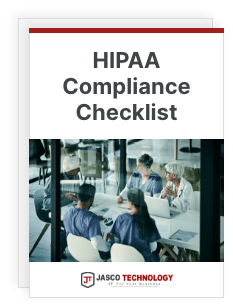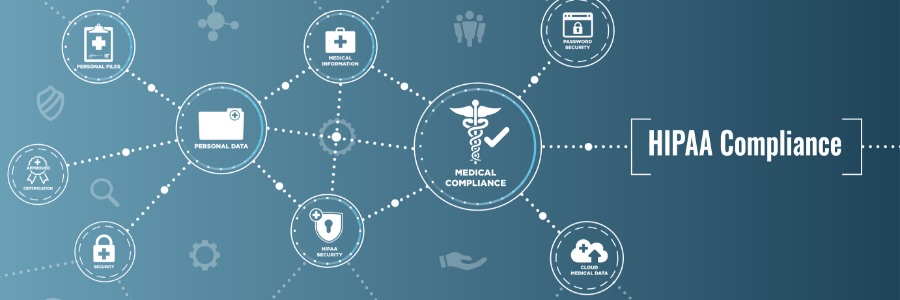The relevance of HIPAA continues to grow as more and more business data moves online. It is critical that all entities that handle protected health information (PHI) meet HIPAA compliance. Not doing so puts yourself and your business at risk of financial penalties, and could result in criminal charges in extreme cases. So, what does HIPAA stand for and why is it so important? In this article we are going to cover the most important terms and the regulations and processes they represent.
What is HIPAA?
HIPPA stands for the Health Insurance Portability and Accountability Act. It is a federal law that sets national standards for protecting sensitive patient information from being disclosed without the patient’s knowledge or consent. According to the U.S. Department of Health and Human Services (HHS), there are two components to HIPAA, the HIPAA Privacy Rule and the HIPAA Security Rule. The Privacy Rule applies to the general protection of health information, and the Security Rule applies specifically to the protection of personal health data that is held or transferred in electronic form.
In order to meet HIPAA compliance, all companies dealing with protected health information (PHI) and electronically protected health information (ePHI) need to have physical, network, and process security measures in place that are always adhered to.
Covered Entities
Individuals and organizations that are subject to HIPAA requirements are known as covered entities. Covered entities include anyone providing treatment, managing operations in healthcare, or receiving payments—healthcare providers, health plans, and healthcare clearinghouses. Also included are any business associates, subcontractors or otherwise, who have access to patient information and provide support in treatment, operations, or payment.
Why is HIPAA important
Why is HIPAA important in the medical field?
With so much data being handled online, from electronic health records (EHR) to computerized physician order entry (CPOE) to pharmacy and laboratory systems, HIPAA compliance should be top of mind for every healthcare business owner. Not complying with HIPAA can result in significant penalties to your business’s bottom line and reputation, and could lead to criminal charges.
HIPAA has also aided the medical field by helping with the transition from paper records to electronic records. It’s helped to improve efficiency in the industry, simplify administrative healthcare functions, and it makes the process of sharing protected health information quick and secure. All covered entities are required to use the same nationally recognized identifiers and code sets, so transferring electronic health information between health plans and health providers has never been easier or safer.
Why is HIPAA important to patients?
Patient security is the main goal of HIPAA; it’s designed to keep their personal data private. It mandates that all covered entities apply several different safeguards to protect a patient’s sensitive health information. Without HIPAA, healthcare organizations would be under no obligation to protect their patients’ private information and would suffer no penalties whatsoever if they let personal data slip through the cracks and fall into the wrong hands.
It also means that patients can obtain copies of their own health information if they wish to find a new healthcare provider. All of their information is protected, kept up to date, and belongs to them. If they decide to switch healthcare providers, no tests need to be repeated, and the new provider will have access to their entire medical history, enabling greater care.
Companies that aren’t covered by HIPAA rules
According to the U.S. Department of Health and Human Services (HHS), HIPAA does not give them “the authority to regulate employers, life insurance companies, or public agencies that deliver social security or welfare benefits.”
This means that HIPAA regulations do not apply to a patient’s workplace, their life insurance provider, or public agencies that deliver their social security or welfare benefits.
Companies and organizations not covered by HIPAA:
- Life insurers
- Employers
- Workers’ compensation carriers
- Most schools and school districts
- Many state agencies, including child protective agencies
- Most law enforcement agencies
- Many municipal offices

Download HIPAA Compliance Checklist
What are the consequences of a HIPAA privacy rule violation?
There are a number of potential consequences for a HIPAA privacy rule violation, and depending on the gravity of the violation, they can cost you hundreds of thousands of dollars and/or time in prison. Within the HHS, the Office for Civil Rights (OCR) is responsible for enforcing the Privacy and Security Rules.
Failure to comply with HIPAA could result in:
- The violation being handled internally by the employer
- Termination
- Sanctions from professional boards
- Criminal charges resulting in significant fines and/or imprisonment
🔎 For more information about HIPAA violations and their consequences, read our article on The Most Common HIPAA Violations You Should Be Aware Of.
How to Maintain HIPAA Compliance Requirements
Understand HIPAA compliance requirements
Understanding your HIPAA requirements and how they apply to you is the first step to maintaining them. Health providers, health plans, healthcare clearinghouses, and their business associates that electronically transmit health information must comply with HIPAA.
Invest in employee training
You may be aware of your HIPAA requirements, but are each of your employees? To ensure every member of your organization remains compliant, invest in employee training. Make sure all employees performing administrative functions know how to properly handle PHI, and consider assigning different levels of security to specific employees so that PHI isn’t being viewed by every member of your staff.
Make sure each employee knows the ins and outs of HIPAA so you never risk your patients’ privacy, and you never face a fine in the hundreds to hundreds of thousands of dollars.
Use cloud-based solutions
Cloud-based solutions streamline healthcare administrative functions, enhance employee efficiency, and make it easy to securely transmit sensitive information. Having strong and reliable cloud infrastructure won’t only make your organization more productive, it will ensure your PHI remains secure. Make sure your computer system has the latest antivirus scanning software, and that you have a detailed backup and recovery plan in place should the worst happen.
How Jasco can help
Get in touch with Jasco today to learn more about HIPAA and how your business can ensure compliance. We offer dedicated IT services for both healthcare organizations and dental offices.

